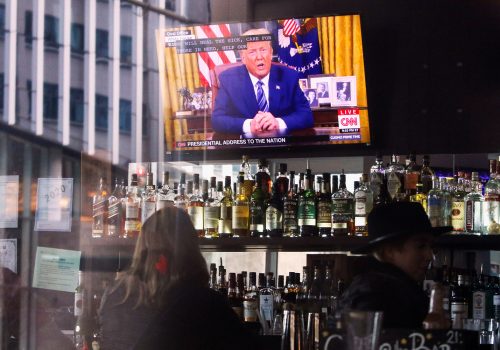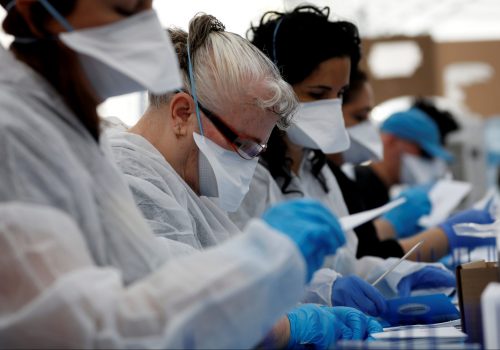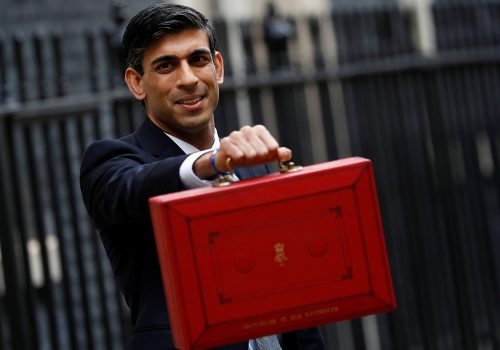CORONAVIRUS ALERT 3/12/2020
The Atlantic Council’s Coronavirus Alert is a regular summary of policy, economic, and business events around the emergency. To stay updated, sign up to the Coronavirus Alert here.
Summary:
US President Donald J. Trump imposed a surprise travel ban into the United States from twenty-six European countries, spooking investors and sending the price of oil lower. As The World Health Organization declared coronavirus to be a global pandemic, countries from Italy to Scandinavia and Ireland via India and South Korea stepped up measures to contain its spread.
Statistics:
There are now in excess of 125,000 cases worldwide in almost 120 countries and territories; more than 4,600 people have died.
QUOTE: “On Wednesday night the global pandemic met US nationalism. It will not take long to see which comes off best,” Edward Luce writes in the Financial Times. “Trump’s address was meant to calm the waters. By the time he finished they were considerably rougher.”
HEALTH AND SCIENCE:
- President Trump’s surprise announcement, barring most travel from Europe to the United States for thirty days starting March 13, except for the UK and Ireland, rattled stock markets and sent travelers scrambling to make new arrangements. “And even in a ten-minute address, Trump couldn’t stick to the facts,” Bloomberg said of the president’s address from the Oval Office.
- “We are all in this together,” The New York Times cited Trump as saying. “We must put politics aside, stop the partisanship, and unify together as one nation and one family.” The World Health Organization declared coronavirus a global pandemic, The Washington Post reported.
- US stock future and global stock prices fell today amid new concerns about the economic impact of coronavirus, The Wall Street Journal said. The price of oil fell too. “The surprise move is likely to mean a further drop in demand for jet and other fuels in an already battered oil market, although just how much is hard to quantify,” Reuters reported.
- “The Extraordinary Decisions Facing Italian Doctors” runs a headline in The Atlantic, as there are too many coronavirus patients to receive adequate care, it reported. Emergency-room doctors are faced with decisions such as how to allocate scarce oxygen among critically ill patients, The Wall Street Journal said. The country plans to shut all shops except for food stores and pharmacies as it tries to contain the pandemic, the BBC said.
- The UK is expected to switch tactics by delaying rather than containing the spread of the virus when the government’s emergency committee meets today, the BBC reported. There are now 460 confirmed cases in the UK and eight people have died, the BBC said. Ireland plans to close schools and colleges from March 13, CNN said.
- Coronavirus sufferers keep the pathogen in their respiratory tract for as long as thirty-seven days, Bloomberg said, citing a study in the Lancet medical journal, suggesting they could remain infectious for a number of weeks.
- Denmark closed down all state schools and told workers to stay at home, Norway shut its borders in areas worst hit by coronavirus and Sweden warned of even tougher measures to come, Bloomberg reported. The measures come as Scandinavia reports 1,700 cases of coronavirus, the newswire said.
- Iran reported seventy-five additional deaths from coronavirus in the past twenty-four hours, taking the total to 429, Reuters said. Victims in the Middle East’s worst-affected country include senior officials, clerics, and politicians, it reported.
- “The coronavirus is named after the crownlike spikes that protrude from its surface,” says an article in The New York Times with the headline “How Coronavirus Hijacks Your Cells”
- Tom Hanks and his wife Rita Wilson, both sixty-three, have tested positive for coronovirus while in Australia, the Academy Award-winning actor said on social media, CNBC reported.
QUOTE: We are deeply concerned both by the alarming levels of spread and severity and by the alarming levels of inaction,” said WHO Director-General Tedros Adhanom Ghebreyesus, cited in The Washington Post.
FINANCE AND ECONOMICS:
- The longest ever bull market for US stocks ended yesterday after a 20 percent decline from the most recent high for the Dow Jones Industrial Average as coronavirus spread worldwide including the United States, The Wall Street Journal reported.
- The European Central Bank presented a stimulus package to counter the economic impacts of the virus, including 120 billion euros of bond purchases and more cheap loans to banks, the Financial Times reported. The ECB kept interest rates at a record low of minus 0.5 percent. Yesterday the UK announced £30 billion to combat coronavirus, including £5 billion of emergency funding for the National Health Service and other public services, the BBC said.
- “With companies having gorged on cheap money, a reckoning may be coming,” the Financial Times says in an article with the headline: “Will the coronavirus trigger a corporate debt crisis?”
- “The Atlantic Council team is (…) working to stay ahead of the implications of this rapidly spreading disease,” writes the Atlantic Council’s Frederick Kempe. “It is during such challenging times, in fact, that our work becomes even more crucial in delivering understanding of the situation and providing policy approaches.”
QUOTE: “We’re groomed to deal with adrenaline, anxiety, bear markets, and bull markets,” Peter Tuchman, of Quattro M Securities Inc., who has been a floor trader on the New York Stock Exchange for thirty-five years, quoted in The Wall Street Journal. “We don’t get emotional about money. But when health and welfare is involved and people’s lives are involved, that sort of eats away at our spirits.”
BUSINESS AND TRAVEL:
- Plane maker Boeing has already tapped all of a $13.8 billion loan arranged barely a month ago, the Financial Times reported, as the company contends with the turmoil in air travel caused by the coronavirus crisis.
- The National Basketball Association has suspended its season “until further notice” after a player for the Utah Jazz tested positive for coronavirus, The Associated Press reported.
- The Wall Street Journal details travel restrictions worldwide, including India’s month-long suspension of tourist visas and health screening by South Korea of visitors from France, Germany, Spain, the UK, and the Netherlands. Health officials in South Korea say the pace of new infections seems to be slowing, Reuters reported.
- There’s a new briefing in the Financial Times setting out the impact of coronavirus on business. Today’s edition includes a link to an opinion piece that says coronavirus is “a global crisis, not a crisis of globalization.”
- Spectators will be barred from watching the ceremony held in Olympia, Greece to light the Olympic flame for the 2020 Tokyo Games because of coronavirus concerns, France 24 reported.
- Some estimates put the cost of postponing the 2020 Summer Olympics in Tokyo, if it comes to that, at up to $75 billion in lost revenue for Japan, CBS News reported.
QUOTE: “The crisis that has so far claimed more than 700 lives in the EU gives authorities in Brussels a chance to prove they are more than toothless bureaucrats,” Reuters Breakingviews says. “So far, their response has been timid.”
RESOURCES
- Johns Hopkins University interactive web-based dashboard to visualize and track reported cases in real-time.
- CDC provides frequent updates and background information on Coronavirus.
- The World Health Organization daily situation reports.
- Harvard Business Review guidance on managing the emergency for corporate decisionmakers.
- The Society for Human Resource Management resources on managing communicable diseases.
- The Wall Street Journal has a useful guide to travel and travel insurance.
- State Department Travel Advisory for China.



